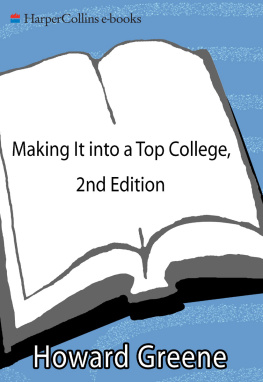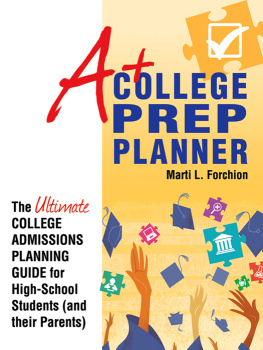In accordance with the U.S. Copyright Act of 1976, the scanning, uploading, and electronic sharing of any part of this book without the permission of the publisher constitute unlawful piracy and theft of the authors intellectual property. If you would like to use material from the book (other than for review purposes), prior written permission must be obtained by contacting the publisher at permissions@hbgusa.com. Thank you for your support of the authors rights.
To all the high school kids in this country who are dreading the crossroads of college admissions and to all the young adults who felt ravaged by it. We owe you and the whole country a better, more constructive way.
P eter Hart didnt try for Harvard, Princeton or any of the Ivies. That wasnt the kind of student hed been at New Trier High School, which serves several affluent suburbs north of Chicago. Nearly all of its roughly one thousand graduating seniors each year go on to higher education, and nearly all of them know, from where they stand among their peers and from the forecasts of guidance counselors, what sort of college they can hope to attend. A friend of Peters was ranked in the top five of their class; she set her sights on Yaleand ended up there. Peter was ranked somewhere around 300: not great but wholly respectable considering the caliber of students at New Trier. He aimed for the University of Michigan or maybe the special undergraduate business school at the University of Illinois.
Both rejected him.
He went to Indiana University instead, and arrived there feeling neither defeated nor exhilarated. He was simply determined to make the most of the place and to begin plotting a career and planning an adult life.
Right away he noticed a difference. At New Trier, a public school posh enough to pass for private, hed always had a sense of himself as someone somewhat ordinary, at least in terms of his studies. He lacked his peers swagger and ready-made eloquence. He wasnt especially quick to raise his hand, to offer an opinion, to seize a position of leadership. At Indiana, though, the students in his freshman dorm and in his freshman classes werent as uniformly poised and showily gifted as the New Trier kids had been, and his self-image went through a transformation.
I really felt like I was a competent person, he told me when I interviewed him in June 2014, shortly after hed turned twenty-eight. It was confidence-building. He thrived during that first year, getting a 3.95 grade point average, which earned him admission into an honors program for undergraduate business majors. And he thrived during the rest of his time at Indiana, drawing the attention of professors, becoming vice president of a business fraternity on campus, cobbling together the capital to start his own tiny real estate enterprisehe bought, fixed up and rented small houses to fellow studentsand finagling a way, off-campus, to get interviews with several of the top-drawer consulting firms that trawled for recruits at the Ivies but often bypassed schools like Indiana. Upon graduation, he took a plum job in the Chicago office of the Boston Consulting Group, where he recognized one of the other new hires: the friend from New Trier whod gone to Yale. Traveling a more gilded path, shed arrived at the very same destination.
Peter worked for three years with the Boston Consulting Group and another two with a private equity firm in Manhattan. When I talked with him, he was between his first and second year at Harvards graduate business school. Yes, he said, many of his Harvard classmates had undergraduate degrees fancier than his; no, he said, he didnt feel that his Indiana education put him at any disadvantage. Besides which, he and most of the others in the Harvard MBA program had been out of college for as long as theyd been in it. What theyd learned in the workplace since graduation had more bearing on their assurance and performance at Harvard than did anything picked up in any class, let alone the name of their alma mater.
The main, lasting relevance of Indiana, he told me, was the way it had turned him into a bolder, surer person, allowing him to discover and nurture a mettle that hadnt been teased out before. I got to be the big fish in a small pond, he said. Now, if he wanted to, he could swim with the sharks.
Jenna Leahy, twenty-six, went through the college admissions process two years after Peter did. She, too, was applying from a charmed school: in her case, Phillips Exeter Academy, which was less than a mile from her familys New Hampshire home and which she attended as a day student. She wasnt at the very top of her class but she had as many As as Bs. At Exeter, one of the most storied prep schools in America, that was nothing to sneeze at. She was also a captain of the cross-country team and active in so many campus organizations that when graduation day rolled around, she received one of the most coveted prizes, given to a student whod brought special distinction to the academy.
Jenna had one conspicuous flaw: a score on the math portion of the SAT that was in the low 600s. Many selective colleges cared more than ever about making sure that each new freshman class had high SAT scores, because that was one of the criteria by which U.S. News & World Report ranked schools in its annual survey, the influence of which had risen exponentially since its dawn in the 1980s. In fact, the college on which Jenna set her sights, Claremont McKenna, cared so much that its dean of admissions would later be exposed for fabricating and inflating that statistic.
Jenna applied early to Claremont McKenna. And was turned down.
She was stunned. She couldnt quite believe it. And partly because of that, she didnt sink into a funk but moved quickly to tweak her dreams and widen her net, sending applications to Georgetown University, Emory University, the University of Virginia and Pomona College, which is one of Claremont McKennas sister schools. She threw in a few more, to have some insurance, though she was relatively certain that she wouldnt need it.
In early spring the news came. Georgetown said no. Emory said no. No from Virginia. No from Pomona. She felt like some kind of magnet for rejection: Earlier that semester, her first serious boyfriend had broken up with her. He was a sophomore at Stanford, the sort of school she was now being told she simply wasnt good enough for. What was she good enough for? What in the world was going on? Many of her Exeter classmates were bound for the Ivies and their ilk, and they didnt seem to her any more capable than she. Was it because they were legacy cases, from families with more money than hers?
All she knew was that they had made the cut and she hadnt.
I felt so worthless, she told me. It was a very, very depressing time.
As she remembers it, she was left essentially with two options. One was Scripps College: another of Claremont McKennas sister schools, though not quite as desired as Pomona. The other was the University of South Carolina. It wanted her badly enough that it offered her a significant scholarship. But that wasnt enough for me, she said. I wanted a name. I wanted some prestige. That was the immediate legacy of the application process. She was determined to grab whatever bragging rights she could.
But there was another, better legacy, which came later. Once she got through the summer, crossed the country to Southern California, beheld how gorgeous the Scripps campus was and saw how well she fit in there, she realized not only that the most crushing chapter of her life was in the past but that it hadnt crushed her. Not even close. Actually, it had helped her separate the approval that others did or didnt give her from what she believedno,











